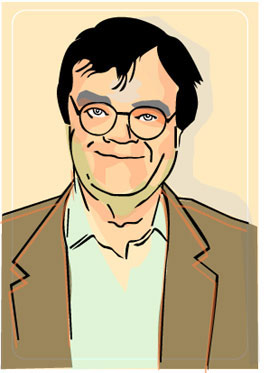Captain Ahab assembled the crew of the Pequod and told them that they could not afford to fail in the quest to kill the great white whale and so he had come up with a plan. The Pequod lay becalmed on a glassy sea, the sails hung loose, the ship drifting with the current. The Captain had mulled over the recommendations of the Moby Dick Study Group and rejected them. “If we turn back to New Bedford now, as the Old Ones suggest, we risk the loss of the high seas.” And so he had decided to put 10 oarsmen in a longboat and to row ahead, towing the ship, “surging” it forward.
In addition, a pair of his pants would be towed in the water behind the ship to lure the great whale within range of the harpoon gun. And finally, the heavier men would stamp their feet on the deck and thereby disorient the creature. It was a three-pronged plan.
Ahab stood on the poop deck, one hand in his vest Napoleon-like, his eyebrows arched, gazing horizonward, turning the wheel, as if the ship were moving and not becalmed, and he looked very commanderly except that he had no pants. The crew stood at formation below him, from which angle it was hard to ignore the captain’s bare leg. (The white whale Moby Dick — WWMD — had chewed up the other leg some time ago.)
Lt. Rice stood behind him, her jaw high, and next to her, Lt. Cheney, his hooded eyes scanning the rank and file, a whip in hand, daring anyone to whisper.
“It’s going to be hard, killing a white whale. We know that. This is a different kind of whale we’re dealing with, not the old blubbery kind. It’s an evil one, bent on our destruction. And I will hunt him down even if I must sail the ship and man the harpoon myself,” the Captain said.
The men stood silent, looking straight ahead. The Captain was a lunatic, clearly, but then lunacy is common in the upper ranks. They had learned to accept it.
(In years to come, students would write term papers about this tragedy, though some would argue that tragedy demands a noble hero, one with pants. The Temple of Ahab at Southern Methodist University in Dallas, however, would not see him as tragic hero, but as a prophet. God told him to do what he did and that is all you need to know. Had he not hunted the whale in its own waters, something terrible would have happened to us at home. Either you believe this or you don’t.)
And there, on the deck, sat two traitorous seamen, who had dared question God’s will and whom Mr. Cheney had chained to a scupper and covered with gallons of tar.
“To give up now would mean that I have lost my leg for nothing!” the Captain cried. “Shall I allow creatures to chew on me without fear of retribution? Am I meant to be a lunch for leviathans? We cannot stop until the monster is dead.” And yet, clearly, the ship was stopped. There was no wind. “We have no choice but to go forward!” he cried. “Onward! Surge with me, men!” Mr. Cheney snapped to attention — “Once again, you have inspired us with your steadfastness, my captain! Blow, men! Blow!” And the crew raised their heads toward the limp sails and they blew with all their might. The smell of beer and onions was strong in the air.
Mr. Cheney said, “We shall not fail you, sir.” And Ahab, a tear glittering on his cheek, seized Mr. Cheney’s hand and shook it, only to find that it was covered with tar. Mr. Cheney had been smacking the traitors whenever they whimpered and his hand was quite black and now the Captain’s hand was, too. He clutched at the wheel and his hand stuck to it.
Just then, loud shrieking sounds came from below as several whales rubbed their backs against the ship’s beams and the Pequod shuddered. The Captain lost his balance and fell into Lt. Rice’s arms. “The ship is surging, sir!” cried Mr. Cheney. The 10 oarsmen leaned to their oars and the crew kept blowing. They took turns, 10 at a time, huffing and puffing. There was no white whale to be seen but there was a sense of something happening, of a surge.
The Captain went below to clean his hands and to pray for further guidance.
– – – – – – – – – – – –
(Garrison Keillor’s “A Prairie Home Companion” can be heard Saturday nights on public radio stations across the country.)
(c) 2007 by Garrison Keillor. All rights reserved.
Distributed by Tribune Media Services, INC.

